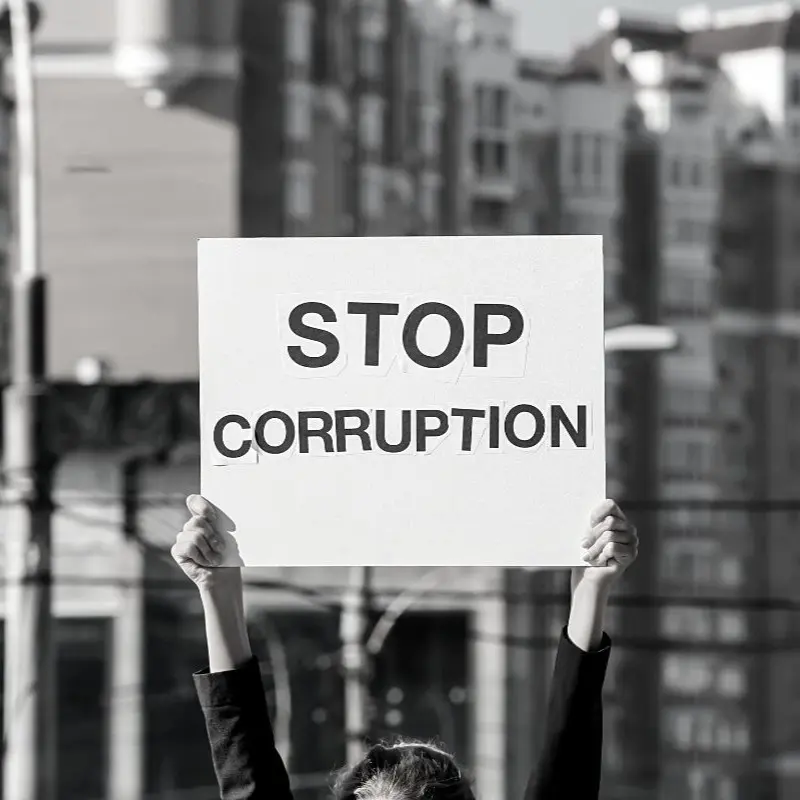The late Professor Johann Schepers often reminded us that you cannot have good judgment in life if you are not able, in the very first instance, to distinguish between “right” and “wrong” or “good” and “bad”. Without deeply ingrained moral values - values that are congruently and genuinely lived, it seems to become incredibly difficult for people to maintain focus on what is “good” for themselves and for society, or what is “bad” for themselves and for society. The worst of all is the fact that as human beings we so easily become used to doing the “wrong thing”! Once you have lied or stolen a few times and gotten away with it, it quite easily becomes a way of life! Over time, you have lost any conscience you may have had before and you are able to rationalise, deny any responsibility and project blame onto others.
Corruption is a disease throughout the world. There are numerous examples of failed governments and failed organisations where corruption benefitted a small elite group but undermined the rest of society. The selfishness of corruption is both insidious and highly contagious. It thrives where there are no consequences, no governance or no oversight. It is therefore a catastrophe when those in leadership are allowed to blur the boundaries between “right” and “wrong”. Their example and the culture they create, could tempt even the strongest follower or employee to conform.
There have been numerous occasions where audiences heard Prof Leon van Vuuren from Ethics SA ask them “what they would be tempted to do when nobody is looking?”. This is a critical question for all of us: What do you do when temptation arises? Those who care about the moral wellness of society should continuously scrutinise their own actions and care about the impact of this on others. Understanding how contagious corruption is, how small it starts and how it grows like wildfire should prompt all of us to do everything possible to counter this threat to society. This approach fits very well with the values and ethical rules found in the discipline of Psychology. We are also supported in this regard by an excellent South African Constitution.
The question however remains how and where we as psychologists should play a role in trying to counter the disease of corruption in our country? What can we do in education, in our work in organisations and everywhere else? Psychological literature provides us with a vast body of knowledge in many areas of speciality. A golden thread throughout the literature gives attention to, for instance, the identification and optimisation of human potential, the development of management and leadership, optimal corporate structure, strategy and wellness or the best educational principles and support of learning and skills development, to name but a few. The focus is most often on ensuring growth, achievement, success, wellness, productivity, innovation and more. None of this can happen, if attention is not also given to working on the ability of people to develop a moral compass, to use this in their judgement and be strong enough to voice their opinion. In addition to the excellent principles found in the South African Constitution, psychologists have a particularly critical role to play in the selection and development of people. We should be looking much wider than just how well the person matches the requirements of a job. Given the youth of our democracy and the harm that can be done with selecting and developing the wrong people, we have to look much deeper at each candidate. Why? Because we have to and we can! Right and wrong has to have its roots in a value system that acknowledges not only your rights but also the rights of others. As people who are trained in the science of behaviour we should do our best to instil a culture against corruption by honestly doing self-exploration: How far have we given way and become used to this as a way of life? We have to do everything possible to build strong moral values, have people live those values, build a culture where people have the right to ask critical and challenging questions - not because they are trying to be difficult but to ensure that the judgement of people (in general and leaders in particular) are correct and wise. Most of all, to stop or slow the disease of corruption we should all be ethical leaders in our own minds, our teams, families, and our society. If we don’t, the habits of corruption will become so entrenched that nobody will know the difference between right and wrong. In no way can such a society be sustainable!
Share this post
Newsletter
Get up-to-date industry news right in your inbox



